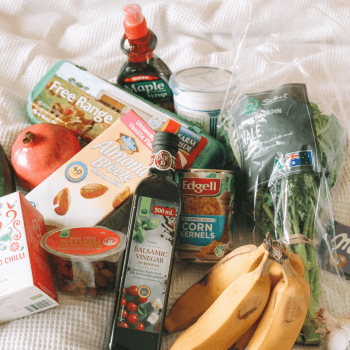Safe Shopping

Does shopping feel like you’re invading hostile territory? That’s the sense many have in this time of pandemic.
By Kerry Mello, Project Coordinator for Mental Health First Aid Training.
The good news is the U.S. Food and Drug Administration says there's no current evidence to support the transmission of COVID-19 from food packaging. Wiping down purchases is your choice, but the greater danger is who you’re shopping with.
Shopping tips to keep you safe:
- Keep it real: If you’re not feeling well, stay home.
- Wear a mask. Masks can protect you from spreading and possibly inhaling the virus. The CDC recommends wearing one whenever in public settings. You can easily make your own mask using household items you already have.
- Stay away from each other: Make sure you stay six feet apart from other people when moving around stores. This is easier now that new guidelines mandate a fraction of usual traffic. Shopping at off-peak hours or on rainy days can sometimes mean shorter lines and fewer people. If you’re a senior, at high risk, or have a disability, take advantage of special shopping hours offered by most local stores.
- Wipe it down. Grab disinfectant wipes when entering the store or bring some from home and wipe your grocery cart, particularly the handles.
- Keep it clean. Bring hand sanitizer and use it frequently inside the store.
- Bag it. When in the produce aisle, use available plastic bags to reach for and scoop up produce.
- Hands below the belt. In other words, do not touch your face.
- Respect the lines. Many stores now have designated spots for social distancing as you checkout. It takes a little longer, but keeps us all safer.
- Avoid the touch: If possible pay with touchless payments. If you have to touch a keypad, or money, use a hand sanitizer after paying.
- Home sweet home -- wash up: Whenever you return from anywhere, the first thing to do is wash your hands. Since the virus can’t survive forever on surfaces, you can put all shelf-stable, groceries and supplies aside for a few days in a designated space before using them. If you want to be extra careful, rinse glass, plastic and other impermeable containers with soap and hot water; wipe down cardboard containers with sanitary wipes; and wash produce with hot water.
- Ding Dong. If you can wait and have the resources, try home delivery. This is especially helpful for people in high risk categories, limiting exposure to others while shopping. It’s best to pay and tip (these folks are putting their lives on the line for you) online or over the phone and have the driver drop the package at your door or in the yard. Demand for these services are very high so order early.
- Clean up: After putting away your food, wash your hands and wipe down counters.
By following these guidelines, you’re helping the people who work in your grocery store and pharmacy. Keeping these workers safe is important. They’re risking their own health to keep us nourished and healthy. We can return the favor.
Disclaimer
This articles provide general information for educational purposes only. The information provided in this article, or through linkages to other sites, is not a substitute for medical or professional care, and you should not use the information in place of a visit, call consultation or the advice of your physician or other healthcare provider.